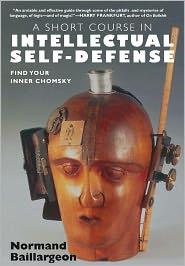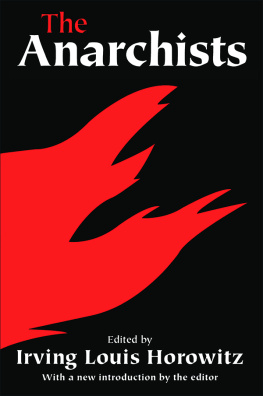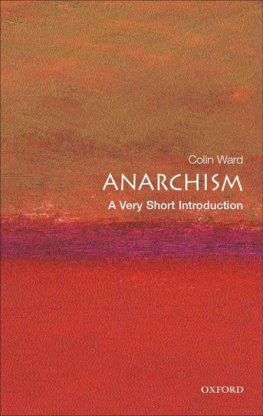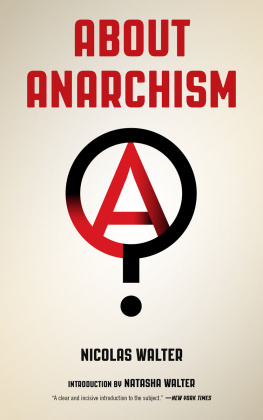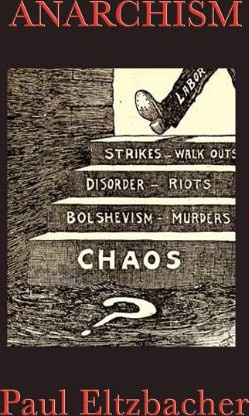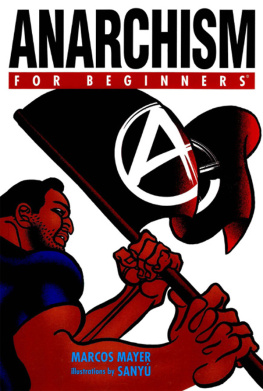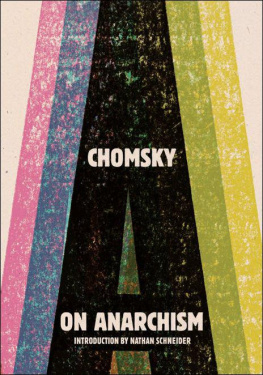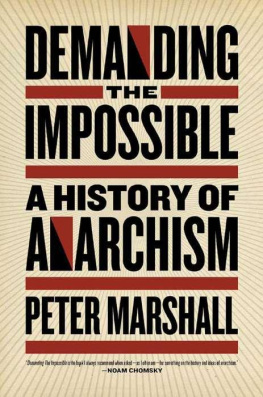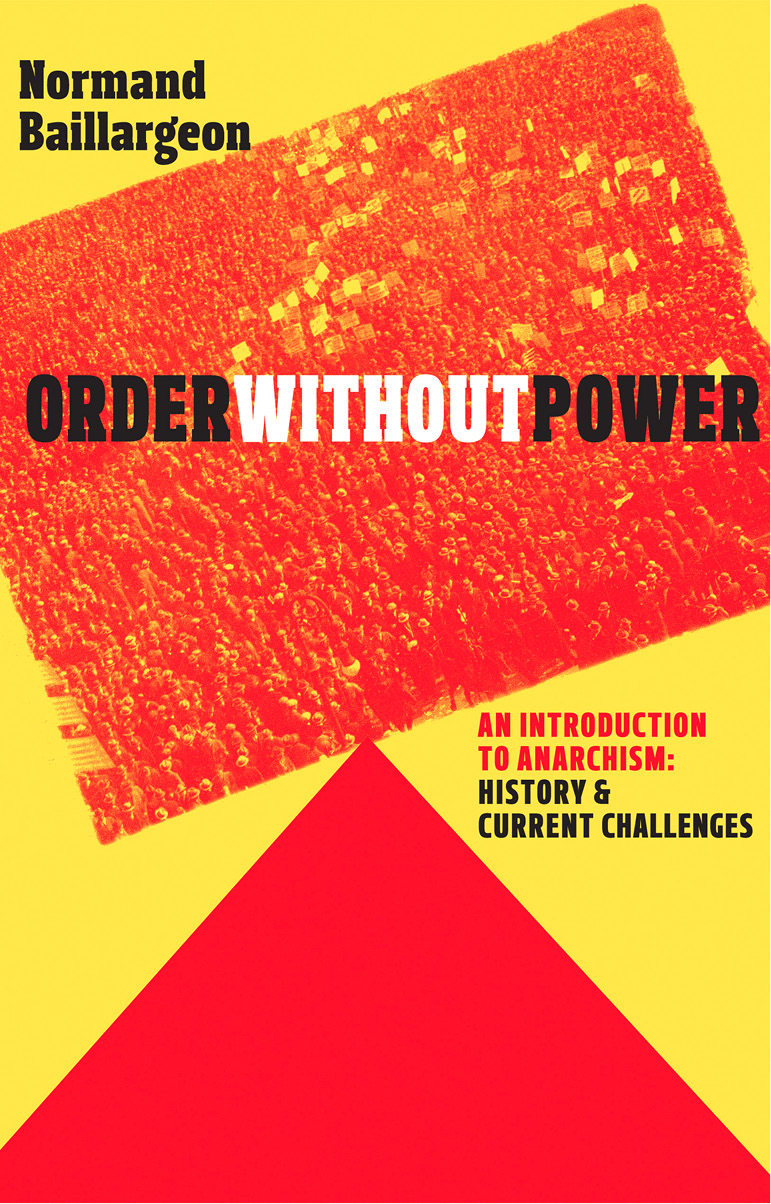ORDER WITHOUT POWER
An Introduction to Anarchism: History & Current Challenges
Normand Baillargeon
Translated by Mary Foster
Seven Stories Press
New York
Copyright 1999 by Normand Baillargeon, 2001, 2008 by ditions Agone.
Originally published in French as Lordre moins le pouvoir: Histoire & actualit de lanarchisme
English translation 2013 by Mary Foster
All rights reserved. No part of this book may be reproduced, stored in a retrieval system, or transmitted in any form, by any means, including mechanical, electronic, photocopying, recording or otherwise, without the prior written permission of the publisher.
Seven Stories Press
140 Watts Street
New York, NY 10013
www.sevenstories.com
Book design by Jon Gilbert
College professors and high school and middle school teachers may order free examination copies of Seven Stories Press titles. To order, visit www.sevenstories.com/textbook or send a fax on school letterhead to (212) 226-1411.
Library of Congress Cataloging-in-Publication Data
Baillargeon, Normand, 1958-
[Ordre moins le pouvoir. English]
Order without power : an introduction to anarchism, history and current challenges / Normand Baillargeon ; translated by Mary Foster. -- A Seven Stories Press first edition.
pages cm
Translation of the authors Lordre moins le pouvoir.
ISBN 978-1-60980-471-8 (E-ISBN: 978-1-60980-472-5)
1. Anarchism. 2. Anarchists. I. Title.
HX833.B25413 2013
335.83--dc23
2013008719
Printed in the USA.
9 8 7 6 5 4 3 2 1
Contents
To be governed is to be kept in view, inspected, spied upon, directed, subjected to legislation, regulated, penned in, indoctrinated, preached to, controlled, weighed up, estimated, censured, commanded. It is, at each turn, each transaction, each move, to be noted, registered, added to the census, tariffed, stamped, measured, marked, subscribed, patented, licensed, authorized, authenticated, admonished, impeded, reformed, redressed, corrected. It is, in the name of public utility and the general interest, to be harnessed, exercised, blackmailed, pressured, monopolized, concussed, mystified, stolen.
Pierre-Joseph Proudhon
Power is crap. Thats why I am anarchist.
Louise Michel
I am a partisan of social and economic equality, because I know that without this, equality, liberty, justice, human dignity, morality and the well-being of individuals as well as the prosperity of nations are only lies. But because I am at the same time a partisan of freedom, the first condition of humanity, I believe that equality should be established in the world by a spontaneous organization of labor and of collective ownership, by the free federation of communes, but certainly not by the supreme and tutelary action of the state. As long as economic and social equality do not exist, political equality will be a lie.
Mikhail Bakunin
No God no master. Better to be.
Jacques Prvert
Anarchism is a tendency in the history of human thought and action which seeks to identify coercive, authoritarian, and hierarchic structures of all kinds and to challenge their legitimacyand if they cannot justify their legitimacy, which is quite commonly the case, to work to undermine them and expand the scope of freedom.
Noam Chomsky
Introduction
Declare yourself to be an anarchist and you arealmost inevitablytaken for a nihilist, a cheerleader of chaos, or even a terrorist.
Nothing could be further from the truth. This is a distortion resulting from decades of skillfully cultivated confusion around the concept of anarchism. Dictionaries are no exception; they generally foster the same preconceptions and prejudices. According to Le Robert , anarchism is supposed to be Absence of government; confusion or disorder which results.
Absence [ an ] of government [ archie ] and thus disorder and chaos, declares Le Littr . Larousse concludes that the anarchist doctrine presents a peculiar mixture of disinterested illuminism and blind or brutal violence. One wouldnt know how to do any worse in so few words.
Elite culture, such as that encountered in academia, sometimes scarcely does better. For example, the relativist and irrationalist epistemology of Paul Feyerabend was recently described and discussed as an anarchist theory of knowledge. This indicates a complete ignorance of anarchism, and of the rationalism that has always inspired it.
In the famous book, Against Method (1975), the Austrian philosopher Paul Feyerabend (19241994) argued that there are no methods or rules for seeking the truth in the sciences: Anything goes. He concluded that science is just one means among others of acquiring knowledge, equivalent to religion or any other tradition, like astrology.
What is anarchism, if all of this is far from the mark?
Etymologically, anarchism is defined as [ an -] (privative) [ archos ] (power, commandment, or authority). Taken literally, it is thus the absence of power or authority. This does not mean confusion or disorder if we accept that the order imposed by authority is not the only possible kind of order. Expressed as simply as possible, this is indeed what anarchism contends. Anarchists believe that this order in the absence of power will be born of freedomfreedom being the mother of order and not its daughter, as Pierre-Joseph Proudhon asserted. In other words, anarchism believes that, in the end, disorder may well only be order without power, in the fine words of Lo Ferr.
Anarchists have incessantly highlighted the antiauthoritarian aspect of their philosophy. For example, Sbastien Faure wrote, Those who refuse authority and fight it are anarchist. Similarly, Proudhon stated, No more authority: not in church, state, land, or money. It would be easy to find many more such statements. I once met an old woman who had fought in the Spanish Civil War. She put it very simply, I am an anarchist: that is, I dont like to give or receive orders.
As can be imagined, to the authorities this idea is unforgiveable; it is an unacceptable ideal. It is thus neither forgiven nor accepted.
As a first approximation, then, we can say that anarchism is a political theory in which the idea of anti-authoritarianism is central. That is, it is a conscious and rational rejection of all illegitimate forms of authority and power. Of course the question then becomes: What constitutes illegitimate power? There are unquestionably powers and forms of authority that pass the test of legitimacy and to which anarchists are willing to submit. As Georges Brassens put it, I am such an anarchist that I go out of my way to cross at the crosswalk!
What are these legitimate powers and forms of authority? Why are they legitimate? There are no simple or definitive answers to these questions. All the less so because anarchism maintains that with the advance of freedom, the field of legitimacy can be revisited and legitimacy denied to forms of power previously accepted as justifiable.
Drawing out the theoretical and practical implications of this antiauthoritarianism, anarchism is the passionate love of freedom and equality. It gives birth to the profound convictionor I should say hopethat relations freely consented to are best suited to our nature; that they alone are definitively capable of ensuring the harmonious organization of society. In the final analysis, they thus constitute the most adequate means of satisfying what Peter Kropotkin called the infinite variety of needs and aspirations of a civilized being.
Anarchism sometimes asserts these ideas in turbulent contexts of revolt. This revolt, aimed at all forms of illegitimate authority (No gods, no masters!), is directed predominantly but nonexclusively against the state. The state is viewed as a higher, particularly powerful and vicious form of illegitimate authority.


